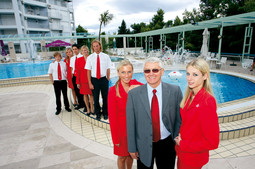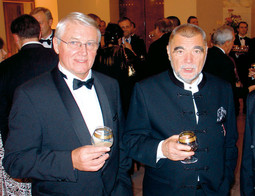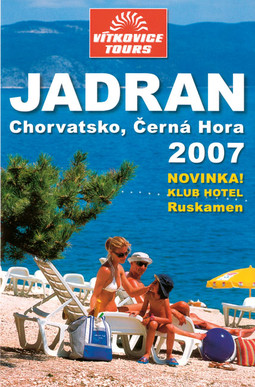Published in Nacional number 617, 2007-09-11
THE LARGEST CZECH TOUR OPERATOR
Czech tourism diagnosis in Croatia
ZDENEK HONEK, the owner of Vitkovice Tours, speaks on how he brought 600,000 Czechs to Croatia, why he first offered Croatian packages in 1992, and what the largest problem in Croatian tourism is
 Zdenek Honek with the employees of Vitkovice Tours: Silvie and Market Manuskov, and Andrea Cahakova, Mihaela Zeniginovska, Danijel Rubic, Homza Vrzgula and Matej Martinščak in the background Zdenek Honek is the owner and general director of the most famous Czech tourism agency Vitkovice Tours. Czech tourists have been visiting Croatia since 1992, when everyone believed that this was a crazy idea. His tourist agency was rated by European journalists to be the best tour operator in the Mediterranean, and he has brought 610,000 tourists to Croatia alone in the past 16 years. Since he opened his agency’s stand at the “Holiday Word” tourism fair in Prague in 1992, engineering and economics graduate Zdenek Honek has created profits of €65 million in Croatia with a large number of tourists. Many believe that he is one of the best European tour operators, especially since Vitkovice Tours received the prestigious “Rhodos” award, which is issued by bankers and mobile operators. Vitkovice Tours is currently included on the official list of 100 most successful Czech companies, and Honek was personally given the ˝2006 Person of the Year˝ award by President Stjepan Mesic last year for his contribution to the development of tourism in Croatia. Therefore Zdenek Honek believes that it is his duty to speak about the weaknesses of Croatian tourism and the laws and regulations which bring direct damage to the industry.
Zdenek Honek with the employees of Vitkovice Tours: Silvie and Market Manuskov, and Andrea Cahakova, Mihaela Zeniginovska, Danijel Rubic, Homza Vrzgula and Matej Martinščak in the background Zdenek Honek is the owner and general director of the most famous Czech tourism agency Vitkovice Tours. Czech tourists have been visiting Croatia since 1992, when everyone believed that this was a crazy idea. His tourist agency was rated by European journalists to be the best tour operator in the Mediterranean, and he has brought 610,000 tourists to Croatia alone in the past 16 years. Since he opened his agency’s stand at the “Holiday Word” tourism fair in Prague in 1992, engineering and economics graduate Zdenek Honek has created profits of €65 million in Croatia with a large number of tourists. Many believe that he is one of the best European tour operators, especially since Vitkovice Tours received the prestigious “Rhodos” award, which is issued by bankers and mobile operators. Vitkovice Tours is currently included on the official list of 100 most successful Czech companies, and Honek was personally given the ˝2006 Person of the Year˝ award by President Stjepan Mesic last year for his contribution to the development of tourism in Croatia. Therefore Zdenek Honek believes that it is his duty to speak about the weaknesses of Croatian tourism and the laws and regulations which bring direct damage to the industry.
NACIONAL: When did you meet President Mesic for the first time?
- When a revolution occurred in the Czech Republic in 1989, I decided to establish a tourism agency. When the war in Croatia began in 1991, I knew that my tourism agency would be specialized for Croatia. One year later at “Holiday Word” fair in Prague, to the amazement of many who knew what was going on in Croatia, I opened a stand for Croatia. I was timidly approached by a group of people who asked me why I was offering vacation in their country where war was raging. I told them the story of how I found myself on the promenade in Split on 21 August 1968 in the middle of the Russian occupation of Czechoslovakia, amongst thousands of Czechs and Slovaks who had been left without money, shelter or food. Airplanes were not flying; buses were not driving. The authorities in Split secured assistance for us, and on their request, I participated in the organization of accommodation. I arrived in Split as a designer for the Vitkovice ironworks, because there was plan for the construction of an aluminium rolling mill and a steel mill in the Kastel Bay. For me, these were significant days and proof of a connection and solidarity between Croatians, Czechs and Slovaks. My worried guests at the “Holiday Word” stand were the directors of large hotels in Istria, so I told them that I could not forget this gesture and that I wanted to give back what I owed to Croatia. That is how my cooperation with Istrian hotels began. In April 1992, I brought a bus full of Czech journalists to Umag and together with the director of the ATP tennis tournament, Slavko Razberger, I made an agreement to meet Stjepan Mesic, who was preparing for his tennis match in the change room at that time. Mesic, the last president of the Socialist Federal Republic of Yugoslavia, did not have any duties at that time and was an average citizen. We came to an agreement in the middle of that match, after the first game, to hold a press conference on the tennis court where he would explain the cause of the war to the Czechs, the situation in Croatia, and what Croatia is seeking in its battle for independence. He did an excellent job, and the interview with Mesic was broadcasted on Czech television five times. In that sense, I also contributed to destroying the distrust of some Czech circles towards Croatian intentions.
NACIONAL: What is today’s Vitkovice Tours?  PRESIDENT MESIC awarded Zdenek Honek in 2006 with the tourism award for 'Person of the Year' - The largest Czech and one of the largest European tour operators for Croatia. Six years ago, we developed operations in Montenegro as well. We are in business relations with three hundred hotels and facilities in Croatia and Montenegro, and we dispose of a sales network of 1200 agencies. We have been using charter flights from Croatia Airlines for twelve years. We have been here for the past sixteen years and we want Croatian tourism to prosper. But, since 2004, your tourism has being suffocated with bureaucracy and mutually contradicting laws and legislation which damage Croatian tourism. I have to say, tour operators and money are escaping from Croatia.
PRESIDENT MESIC awarded Zdenek Honek in 2006 with the tourism award for 'Person of the Year' - The largest Czech and one of the largest European tour operators for Croatia. Six years ago, we developed operations in Montenegro as well. We are in business relations with three hundred hotels and facilities in Croatia and Montenegro, and we dispose of a sales network of 1200 agencies. We have been using charter flights from Croatia Airlines for twelve years. We have been here for the past sixteen years and we want Croatian tourism to prosper. But, since 2004, your tourism has being suffocated with bureaucracy and mutually contradicting laws and legislation which damage Croatian tourism. I have to say, tour operators and money are escaping from Croatia.
People come to Croatia because they love the sea, nature, and they want to spend their vacation here. But they are no longer satisfied with the sea, a bed, and a steak. People are seeking experiences. Croatia has created so many barriers in legislation and laws, that it has become heaven for inspectors who are seeking errors. After this season, a new wave of unhappy German, French, Czech tour operators and agencies are leaving Croatia, who have brought a large number of tourists to Croatia. They understand that there is no point to fight against laws and regulations which are not logical and damage all parties.
NACIONAL: Which regulations and laws do you mean?
- All world destinations which are a hit for tourists allow guests to spend their vacation as they wish and meet the desires of tour operators. Bulgaria is currently a world legend; the largest hotel chains are present there. All implement their animation according to what the guest requests and bring animators with no problems. The Croatian government is still implementing an annual quota for foreign employment. The Croatian government does this each year. For 2007 in tourism, Croatia is allowed to issue 257 work permits. How did they reach these numbers?
In 2007, there are 55 foreign tourism animators allowed in Croatia. However, Vitkovice Tours alone requires at least fifteen. I do not understand how animators for our guests can be Slovenian or English and I cannot imagine that our guests will have to learn Slovenian or English because of them to have fun. If tour operators hire their own animators, they are penalized because they do not have a work permit.
NACIONAL: Why would an animator, agency representative or tour guide, who is only in Croatia for 14 days, even need a work permit?
- That is what I am wondering. A work permit is issued for an existing job position which, for example, a Czech animator would take from a Croatian animator. That would make sense. How can someone determine the number of work permits for tourism animators when these position do not exist, or when they do not know whether a tour operator will come to Croatia. In other parts of the world they tell us: “Bring one hundred of your animators or representatives but make sure each brings 50 guests who will spend money!” However, the Croatian inspectors and police, based on regulations and the decision made by the government on quotas, have been executing recession for four years and are seeking work permits for individuals who spend 14 days accompanying and serving guests. Many countries don’t even have such laws. Bulgaria does not have any regulations which limit the work of tourism representatives and animators. The guests seek animation in their native language. No one can animate guests from the Czech Republic, Hungary, and Lithuania except in Czech, Hungarian or Lithuanian. Your legislation inhibits this, and the inspectors react, do their job and penalize. That is the greatest mistake in Croatian tourism. Guests are not returning from their holidays in Croatia happy, and that is dangerous for Croatia. If job positions would be opened in a tour operator’s agency, I understand that the government would ensure that Croatians were hired.
 IN CROATIA AND MONTENEGRO Honek works with 300 hotels and other facilities, and disposes of a sales network of 1200 agencies
IN CROATIA AND MONTENEGRO Honek works with 300 hotels and other facilities, and disposes of a sales network of 1200 agencies NACIONAL: What limitations exist for tourism representatives? - We have counted; tourism representatives need to bring 21 documents to Croatian institutions for a business permit, after which they must wait two months in fear of whether they will even get the permit. In order to receive a work permit, the representative for a foreign tour operator must bring a signed contract with a national company. Why if they are not employed in a Croatian hotel or agency, nor are they paid or employed by Croatians? There is no logic; they are only requesting formal documents whereby the tour operators are penalized. And that is the reason why they decide to leave, because there is no point to working in this country.
NACIONAL: What does the Foreigners Act specify?
- The Foreigners Act from 2003 is heaven for inspectors. It contains everything a foreigner needs to have when they seek a work or business permit, and that is where they make a big mistake. The second mistake is determining a final quota for work permits. In Croatia this year, there are a total of 95 representatives allowed; in Dalmatia, in four counties, there can be only 40. In Makarska alone, there are ten representatives for Vitkovice Tours. Everyone in Central and Eastern Europe are beginning to ask whether Croatia needs tourists and income from tourism or not. The best solution would be to remove the limits on work permits and tourism quotas from the Act. That is what Croatia’s large competitor Tunis has done. The number of tourism representatives or animators who will arrive is not important as long as they bring guests with them. But instead of that, a worse situation will emerge with the new Foreigners Act.
NACIONAL: Why?
- The new Foreigners Act, which will come into effect on 1 January 2008, will bring new tension and misunderstandings, because it is not coordinated and is contrary to the Tourism Activities Act. In the new Foreigners Act, it states that defined categories of foreigners can work without a work permit if they do not reside in Croatia for more than 30 days. This also appertains to foreigners under special legislation who offer tourism services. Pursuant to the new Foreigners Act, tourism representatives and animators could work in Croatia without work or business permits. This is contrary to the Tourism Activities Act which does not allow that. The legislation does not coincide; there is no coordination between tourism, the police and foreign affairs. Such a situation is poison for Croatian tourism, because it disables tour operators.
NACIONAL: What did the new system of investments of foreign tour operators in hospitality bring to Bulgaria?
- It brought Bulgaria immediate money, investment, hotel construction, and secured employment. Foreign tour operators were not the investors, but they did secure money and paid their services in advance, which secured new technology and management, and provided the desired animation. Tour operators forced themselves to bring guests there for ten years. People from TUI told me: “Bulgaria has advanced over Croatia by seven years!” I laughed at them. But I went there and saw that it was the truth. Croatia does not have a chance to have the same results. Croatia, by increasing hotel profits, has significantly risen above the average European prices.
'The competition is not followed'
"The bad thing in Croatia is that competition by its closest neighbours and the Mediterranean are not followed or taken seriously. Furthermore, the government does not motivate hoteliers. Unfortunately, they are too busy dealing with employment quotas and permits for tourism representatives and animators", said Honek on the problems in Croatian tourism.
Related articles
Why the State Attorney's Office did not draft the Ina contract
Former Croatian President Stjepan Mesic was one of the first in Croatia to call for the public release of the Veteran's Register. Nacional's reporter… Više
Latest news
-
28.10.2010. / 14:15
'A profitable INA is in everyone's interest'
-
28.10.2010. / 09:38
Sanader’s eight fear SDP — Won’t bring down Government
-
21.10.2010. / 15:02
Interior Ministry turned a blind eye on Pukanic assassination
-
20.10.2010. / 09:34
Barisic could bankrupt HDZ




